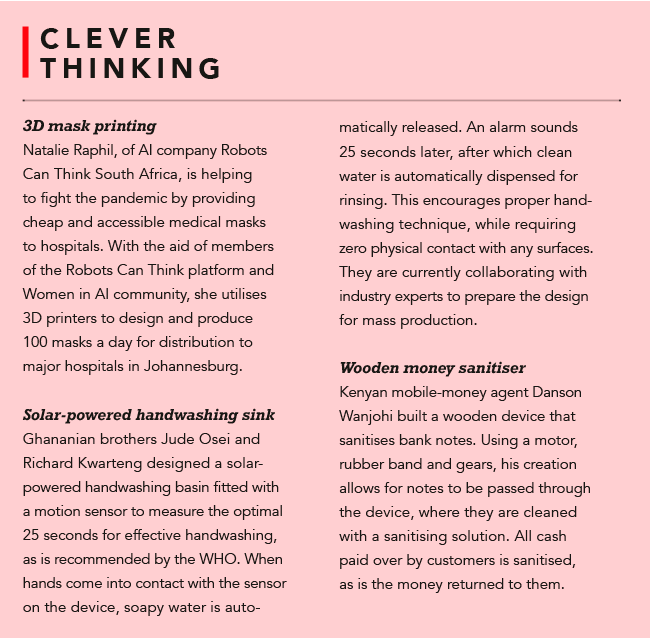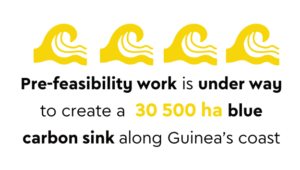Typical years-long timelines for the development of new pharmaceutical drugs and healthcare technologies have been concertinaed into weeks – and sometimes just days – as the world grapples with the mammoth COVID-19 threat. And amid the chaos of infection rates and spikes in patient numbers that have put systems under pressure, the rapid acceleration of healthcare innovation is changing the African health system.
According to WHO analysis, as at October 2020 the pandemic had galvanised the development of more than 120 health-technology innovations that had been piloted or adopted in Africa. The continent accounted for 12.8% of the 1 000 new or modified technologies developed across the globe to target different areas of the COVID-19 response, it found.
Award-winning Nigeria-based journalist Paul Adepoju, writing in the respected medical journal the Lancet, calls it ‘a watershed moment’ for health technology on the continent. Forbes Africa labelled COVID-19 ‘the ultimate disruptor’, while the Tony Blair Institute for Global Change predicted that these technology innovations would have profound implications for Africa way beyond the current global pandemic. ‘COVID-19 is one of the most serious health challenges in a generation, but it is also an opportunity to drive forward innovation, ingenuity and entrepreneurship in life-saving health technologies,’ writes Matshidiso Moeti, the WHO’s regional director for Africa, in an article on the WHO Africa website. The pandemic, adds Moeti, has also given fresh impetus to ‘the need to invest in innovation and to put the right policies and strategic frameworks in place to unleash African ingenuity on the world’.
The WHO study, examining the raft of new and modified innovations related directly to the onset of the coronavirus pandemic, found that 57.8% of the technologies in Africa were ICT-driven, 25% were based on 3D printing, and 10.9% were robotics. The ICT-related innovations were varied, ranging from WhatsApp chatbots in South Africa, self-diagnostic tools in Angola, contact-tracing apps in Ghana, to mobile health-information tools in Nigeria. South Africa at 13%, Kenya (10%), Nigeria (8%) and Rwanda (6%) were responsible for the most innovations in Africa.

University of Pretoria (UP) scientists Tahir Pillay, Bettina Chale-Matsau and Reggie Govender won first prize in the Biosciences category in the Gauteng province’s Accelerator programme for their innovative rapid test for SARS-CoV2. The quick, and cheap, test strip/kit uses nanobodies, a special type of antibody produced in bacteria, to detect viral proteins. According to Pillay, who is also the head of pathology and chemical pathology at the UP/National Health Laboratory Service at the Steve Biko Academic Hospital, the nanobodies ‘can also be used to design ”dipstick” tests, to test saliva, and produce a result in a few minutes, like a pregnancy test. These can be used in communities and homes for COVID-19 diagnosis. They can also be used in an airport testing centre’.
Additionally, in tests conducted with the National Institute for Communicable Diseases, the nanobodies have been shown to neutralise SARS-CoV-2 in cells.
In Nigeria, engineering student Usman Dalhatu built the Respire-19 portable ventilator in response to a shortage of equipment in the country’s COVID-19 wards. Ventilators are essential equipment to help prevent respiratory-related deaths due to COVID-19. The first version of the ventilator, which he worked on with his partners Yunusa Muhammad Garba of Gombe State University’s human anatomy department, and mechatronics graduate Aliyu Hassan, was transformed into a portable, ultra-modern E-vent automatic ventilator. The trio presented the Respire-19 to the governor of Gombe, Muhammad Inuwa Yahaya, in April last year.
Robotics have also played an important role. Students from the Dakar Polytechnic School in Senegal built a multi-functional robot designed to lower the risk of COVID-19 patients contaminating caregivers. Equipped with cameras, the device is remotely controlled via an app. The designers say it can move around the rooms of quarantined patients to take their temperatures, and deliver medication and food.
According to Lamine Mouhamed Kebe, one of the students behind the concept of the robot, the innovation will reduce the exposure of doctors and nurses to infected patients, and limit the need for expensive protective gear. ‘At a certain point […], we realised that medical equipment was limited,’ Kebe told AFP. ‘We had to do something.’ He added that because doctors could communicate with patients through the robot, this extended its potential to facilitating treatment in isolated rural areas.
Further north, in Tunisia, engineers created a web-based platform that scans lung X-rays to evaluate whether patients are likely to have contracted COVID-19. While it’s not the first initiative of its kind in the world, Mustapha Hamdi, an academic and one of the platform’s developers, says it is the first to be openly available. The AI-assisted COVID-19 examination of CT/XR images isn’t a diagnostic tool, but it provides a 90% reliable indication of the probability of infection, he says. Teachers and students at the Tunisian engineering and technology institute INSAT have been developing the platform since mid-March 2020, with the support of German development agency GIZ, the Italian Society of Medical Radiology, and US tech giant IBM. Thousands of X-rays of the lungs of healthy people and COVID-19 patients have been fed into the platform, enabling AI to learn to recognise signs of the virus on the lungs.
African scientists, meanwhile, are appealing to governments and other stakeholders to back their innovations with adequate support. Writing on the University of Cape Town website, scientists Salome Maswime, Collet Dandara and Sudesh Sivarasu emphasise that there is an urgent need for ‘national regulatory bodies to develop and deploy dedicated fast-tracking mechanisms to support these kinds of technologies’.
Sub-Saharan Africa is the region with the largest number of economies currently performing above expectations for their level of development, according to the World Intellectual Property Organisation.
Experts, however, stress that while this is encouraging, investment is vital to keep the spark of innovation alive. A study by the World Bank reports that African countries, at around 0.01% per capita, invest far less in innovation than developed countries, and that the continent is not living up to its potential.
The WHO has recommended greater investment in ICT infrastructure, robotics, AI, drones and mechatronics, and wants to see the necessary policies put in place to continue boosting creativity and entrepreneurship, and bolstering university-led research.
‘We know that investing in innovation yields huge dividends,’ says the WHO’s Moeti. ‘With COVID-19 and other health threats part of our daily life [on the African continent], there’s no time to waste.’
















